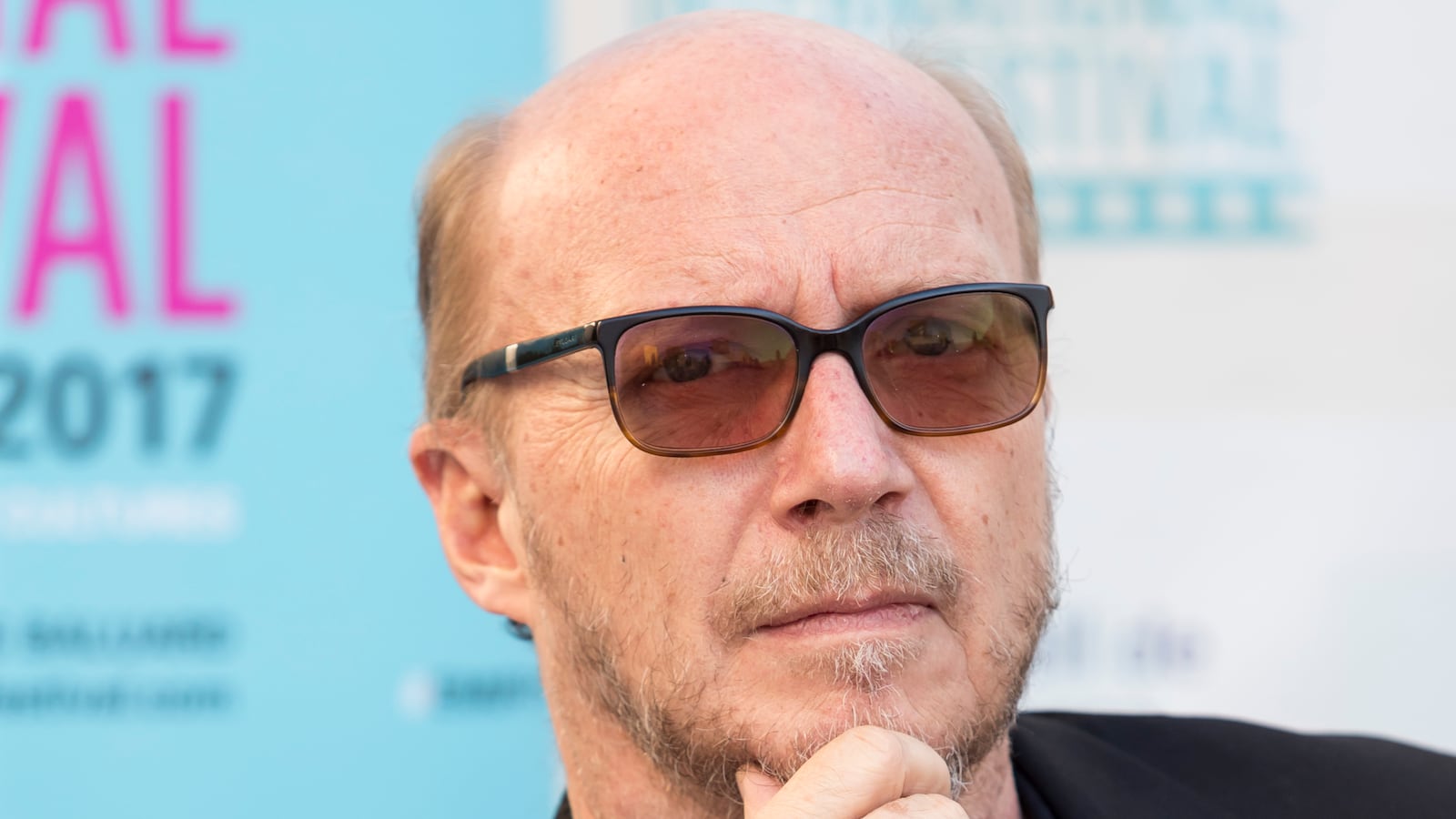Director Paul Haggis has been found liable on three counts of rape and sexual abuse after a former publicist accused him of raping her at his SoHo penthouse in 2013.
The jury awarded Haleigh Breest—who accused Haggis of violently raping her and forcing her to perform oral sex—$7.5 million, with punitive damages to be decided at a later date. Haggis could possibly take the stand again on Monday for adverse direct questioning by Breest’s lawyers as part of the punitive damages process.
It’s unclear if Haggis’ legal team will appeal the court’s decision. The Daily Beast has reached out to Haggis’ lawyers for comment.
The New York Times reported that Haggis’ daughters cried as the verdict was read out, with the director turning to them and mouthing “it’s ok.”
Breest welcomed the verdict in a statement to The Daily Beast.
“I am grateful that I had the opportunity to seek justice and accountability in court—and that the jury chose to follow the facts—and believed me,” she said. “The greatest source of comfort through this five year legal journey has been the support I felt from the women who bravely shared their own stories and let me know I wasn’t alone.”
Her lawyer said they were thankful for the jury’s verdict—which came at 4:40 p.m. on Friday after the jury deliberated for about six hours.
“We’re grateful the jury was careful, methodical—they looked at all the evidence and they did justice. It’s been a long time to get justice and finally we have it and we’re very happy about that.”
Haggis’ lawyer Priya Chaudhry said she was “disappointed and shocked by this verdict.”
“We were not allowed to tell the jury so many critical things, such as the fact that when Ms. Breest first demanded $9 million for her silence, Paul Haggis is the one who went to the District Attorney and spoke to the police, not Ms. Breest, the fact that he sued her for extortion, and the fact that this lawsuit has financially ruined him,” she said. “It was impossible for Mr. Haggis to get a fair trial once the judge allowed the statements of 4 other women who never went to the police, never took any action against him, and 3 of 4 never even came into the courtroom.”
During the civil trial, Haggis’ lawyers claimed that the 36-year-old was an “absolute liar” and a “jealous woman” whose flirtatious crush on Haggis turned vindictive when he “politely rejected” her following a one-night stand. In closing arguments, Haggis’ defense counsel, Priya Chaudhry, called Breest’s accusations “a blatant cash grab.”
The former Scientologist’s legal team had also tried to argue that the Church of Scientology, which Haggis publicly defected from in 2009, had covertly manufactured the allegations and the case against the screenwriter in a clandestine effort to smear his name and bring about his downfall.
Breest testified that Haggis pinned her against a wall inside his top-floor Manhattan loft, before forcing her to perform oral sex on him, claiming she gagged repeatedly as Haggis straddled her face. Breest, then 26, said the Crash director then shoved her on a bed and vaginally raped her.
“He’s trying to pull my tights down and I’m trying to pull them up,” Breest said in court. “He looked like the devil—he looked totally different than I’d seen him before.”

Paul Haggis with his two Oscars for the movie Crash.
Ian West - PA ImagesBreest, who fielded approximately 2,500 questions under cross-examination, according to her lawyers, filed her lawsuit against Haggis in 2017—four years after the alleged encounter. She told jurors she’d been driven to speak out after what she felt were hypocritical tweets and comments Haggis made in newspapers disavowing Hollywood titan and convicted sex offender Harvey Weinstein at the height of the #MeToo movement.
After Breest filed her suit, four other women came forward and accused Haggis of raping or attempting to sexually assault them in incidents that unfolded between 1996 and 2015. The four Jane Does, who are all Canadian, testified or had recorded depositions played in court during the trial. On the stand, Haggis denied any sexual misconduct involving the alleged victims.
Haggis, who has long denied the sexual assault allegations, told jurors the tryst with Breest was consensual. At times weeping on the witness stand, Haggis described Breest as “cartoony” and “bashful” like “Betty Boop,” sending him “mixed signals” inside his penthouse suite in the moments leading up to the sexual encounter. Haggis, who admitted at trial he’d “always been a flirt”, testified he and Breest had traded “flirtatious” work-related emails for months prior to the alleged encounter.
He told the court Breest willingly gave him oral sex but denied having vaginal intercourse with her. He was unable to say for certain whether or where he may have ejaculated on the night in question, despite seminal fluid belonging to Haggis being found in the interior crotch of tights Breest had worn the evening of the incident.
Haggis also testified how the civil sexual assault case had practically bankrupted his finances and destroyed his career in filmmaking.
“For five years I’ve been unable to clear my name,” Haggis told jurors moments after taking the stand in the trial.

(L-R) Maria Bello, Paul Haggis, Moran Atias, Mila Kunis, and producer Michael Nozik attend the premiere of Third Person, Haggis’ last major movie credit.
Kevin WinterHaggis’ last major credit was screenwriting 2013’s romantic drama Third Person, which boasted a star-studded cast including Liam Neeson, Mila Kunis, Adrien Brody, and Olivia Wilde. Haggis, who was working in Italy on the film around the time of the encounter with Breest, had flown in from Rome hours before the film premiere after-party he attended on the night in question.
The two-time Oscar-winner testified his prolific career in film came to a screeching halt once Breest filed her lawsuit in 2017.
In June, Haggis was arrested in Italy after a British woman there accused the 69-year-old of raping her “for days” at a hotel. Haggis, who denied the allegations, ultimately spent 16 days detained in a hotel room on house arrest. An Italian judge later dismissed the case, citing a lack of evidence.
His lawyers at the time argued that the victim had sought a sexual encounter with Haggis in exchange for a role in a James Bond film. Haggis previously wrote 007 spy thrillers Casino Royale and Quantum of Solace.
At his civil trial, Haggis’ counsel suggested Breest had possibly “fantasized” the encounter with the Canadian screenwriter.
“There are three ‘r’ words that happened here: rejection, regret, and revenge,” Chaudhry told the jury during her closing arguments on Nov. 9. “And none of these ‘r’ words are rape.”
She added: “They want you to think where there’s smoke there’s fire, but sometimes there’s just a smoke machine.”
Breest’s suit had sought unspecified damages.
During the case’s closing arguments, however, Ilann Maazel, Breest’s attorney, painted Haggis as a serial predator who repeatedly lied to jurors on the witness stand.
“We have to face the cold, hard truth—Paul Haggis is a monster,” Maazel told the court Wednesday. “He is a psychopath. He is cunning and deceitful and manipulative. He sexually assaulted five women and he has the gall to get up on that stand and play the victim.”

Film director Paul Haggis (R) arrives at New York Supreme Court for the first day of his trial.
ANGELA WEISSIn September, Haggis won a pre-trial court battle in which the case’s judge, Sabrina Kraus, allowed the filmmaker to argue that the Church of Scientology had manufactured the allegations and the case against him.
“One can never tell the story of Paul Haggis without talking about Scientology,” Chaudhry also stated in her closing arguments. “For most of his life—and for the rest of his life—Scientology is permanently attached to him like a dark shadow. Scientology will be the first thought he has when someone breaks into his apartment. It will always be around a dark corner and that is always true for Paul. That is true for Mike Rinder. That is true for Leah Remini. You cannot tell these people’s stories without talking about Scientology.”
Haggis’ legal team, who noted the burden of proof wasn’t on them to affirmatively prove the Church of Scientology was somehow behind the case, however, failed to draw a distinct connection between Scientology and the rape he was accused of after four weeks of testimony.
Breest and the four Jane Does continually denied under oath any ties to the controversial religion. Her lawyers described the legal strategy as a “sideshow” defense designed to distract jurors.
“We are not on retainer for the Church of Scientology," Breest’s attorney Zoe Salzman told The Daily Beast last week. “Never have been, never will be.”
The Church of Scientology has also firmly denied involvement in Haggis’ rape case.
“The Church has nothing to do with the claims against Haggis nor does it have any relation to his accusers,” Karin Pouw, a spokesperson for the Church, told The Daily Beast in an October statement.

Mike Rinder (L) and Leah Remini attend a screening of Leah Remini: Scientology and the Aftermath.
Michael Kovac/Michael KovacScientology whistleblowers, TV actress Leah Remini and former church executive Mike Rinder, both long-time friends of Haggis, testified at trial in defense of the embattled screenwriter in an effort to bolster his defense team’s Scientology claims.
Remini and Rinder, who co-hosted the Emmy-winning A&E series Leah Remini: Scientology and the Aftermath, testified that Haggis was one of the top-three enemies of the church.
Remini, who testified via a live video link from Beverly Hills last week, dived into the Scientology lexicon, describing to jurors “suppressive persons,” “disconnection,” and “fair game”—the alleged extreme practice of destroying any perceived enemies of the church by any means necessary.
The King of Queens actress also spoke of actor Tom Cruise’s “deity”-like status in the religion, which Haggis corroborated in his testimony, in which he described the eccentric actor as the second-most important person in Scientology next to David Miscavige.
Rinder, in an emailed statement to The Daily Beast, called Haggis’ guilty verdict a “travesty of justice.” He claimed the jury was left in the dark regarding Breest’s purported attempt to extract a $9 million during an out-of-court settlement from the Million Dollar Baby writer prior to the former publicist filing the civil rape suit.
“I hope his lawyers appeal this decision,” Rinder said Friday. “And I am saddened to know that scientology is gloating in the wings.”






